初一情态动词讲解及练习
情态动词讲解以及倒装句练习40题(附答案)

may和might的用法 和 的用法
1. 表示许可。 表示请求、允许时,might比may的语气更委婉一些,否定回答时(口语中常 用) no , you can't . or , yes, please 用mustn't表示“不可以”、“禁止”、“阻 止”之意(具有强烈禁止的意思)如: You may drive the car. — Might I use your pen? — No, you mustn't. 用May I ... 征询对方许可在文体上比较正式,在口气上比较客气。在日常 口语中,用Can I ... 征询对方意见在现代口语中更为常见。
must和have to的用法 和 的用法
1. 表示必须、必要。(must表示主观多一些而have to则表示客观多一 些)如: You must come in time. 回答must引出的问句时,如果是否定的回答,不能用mustn't,而 要用needn't或don't have to。 — Must we hand in our exercise books today? — Yes, you must. (No, you don’t have to.)
Could 和 can 的用法
. 表示能力或客观可能性,还可以表示请求和允许。如: Can you finish this work tonight? Man can not live without air. — Can I go now? — Yes, you can. 注意:①could也可表示请求,语气委婉,主要用于疑问句,不可用于肯定句, 答语应用can(即could不能用于现在时态的简略答语中)。如: Could I come to see you tomorrow? Yes, you can. (否定答语可用No, I'm afraid not.) ②can表示能力时,还可用be able to代替。如: I'll not be able to come this afternoon.
初一英语情态动词推测用法练习题40题含答案解析

初一英语情态动词推测用法练习题40题含答案解析1.There must be a lot of students in the library. It's very quiet.must becan't bemight becould be答案解析:must be。
“must be”表示肯定的推测,意思是“一定是”。
图书馆很安静,通常情况下安静的地方可能有很多学生在学习,所以用“must be”比较合理。
“can't be”表示否定的推测,不符合题意。
“might be”和“could be”表示可能性较小的推测,没有“must be”肯定。
2.The boy in the classroom must be Tom. He is the only one who wears a blue shirt today.must becan't bemight becould be答案解析:must be。
题干中明确指出男孩是唯一穿蓝色衬衫的人,所以肯定是Tom,用“must be”。
“can't be”否定推测不符合。
“might be”和“could be”可能性小,不如“must be”确定。
3.There must be some books on the desk. I saw the teacher put them there.must becan't bemight becould be答案解析:must be。
看到老师把书放在桌子上了,所以肯定有书在桌子上,用“must be”。
“can't be”不对。
“might be”和“could be”表示不确定,这里已经确定看到老师放书了。
4.The girl who is singing must be Lily. She has a beautiful voice.must becan't bemight becould be答案解析:must be。
初中英语情态动词专项练习(附答案解析)
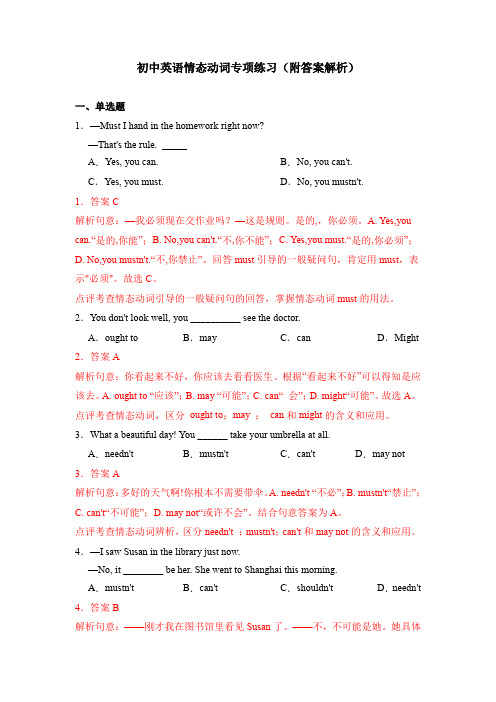
初中英语情态动词专项练习(附答案解析)一、单选题1.—Must I hand in the homework right now?—That's the rule.A.Yes, you can.B.No, you can't.C.Yes, you must.D.No, you mustn't.1.答案C解析句意:—我必须现在交作业吗?—这是规则。
是的,,你必须。
A. Yes,you can.“是的,你能”;B. No,you can't.“不,你不能”;C. Yes,you must.“是的,你必须”;D. No,you mustn't.“不,你禁止”。
回答must引导的一般疑问句,肯定用must,表示"必须"。
故选C。
点评考查情态动词引导的一般疑问句的回答,掌握情态动词must的用法。
2.You don't look well, you __________ see the doctor.A.ought to B.may C.can D.Might 2.答案A解析句意:你看起来不好,你应该去看看医生。
根据“看起来不好”可以得知是应该去。
A. ought to “应该”;B. may “可能”;C. can“ 会”;D. might“可能”。
故选A。
点评考查情态动词,区分ought to;may ;can和might的含义和应用。
3.What a beautiful day! You ______ take your umbrella at all.A.needn't B.mustn't C.can't D.may not 3.答案A解析句意:多好的天气啊!你根本不需要带伞。
A. needn't “不必”;B. mustn't“禁止”;C. can't“不可能”;D. may not“或许不会”。
七年级英语情态动词can和could辨析练习题20题答案解析

七年级英语情态动词can和could辨析练习题20题答案解析1.Can you play basketball?Yes, I can.No, I can't.答案解析:本题考查can 的一般疑问句及回答。
can 表示能力,“能、会”。
问句“你会打篮球吗?”肯定回答是“Yes, I can.”,否定回答是“No, I can't.”。
2.Could you help me with my homework?Sure.Sorry, I can't.答案解析:could 在本句中表示委婉的请求。
“你能帮我做家庭作业吗?”回答“Sure.”表示同意,“Sorry, I can't.”表示不能帮忙。
can 用于回答时比较直接。
3.I can swim very well.I could swim when I was five.答案解析:前一句用can 表示现在的能力,“我游泳游得很好。
”后一句用could 表示过去的能力,“我五岁的时候就会游泳。
”4.Can he speak English?Yes, he can.No, he can't.答案解析:考查can 对现在能力的询问及回答。
“他会说英语吗?”肯定回答和否定回答分别是“Yes, he can.”和“No, he can't.”。
5.Could you pass me the book?Here you are.Sorry, I can't find it.答案解析:could 表示委婉的请求,“你能把书递给我吗?”回答“Here you are.”表示递给对方书,“Sorry, I can't find it.”表示找不到书不能递给对方。
6.I can draw pictures.I could draw pictures yesterday.答案解析:第一句用can 表示现在的能力,“我会画画。
情态动词讲解及练习(含答案)
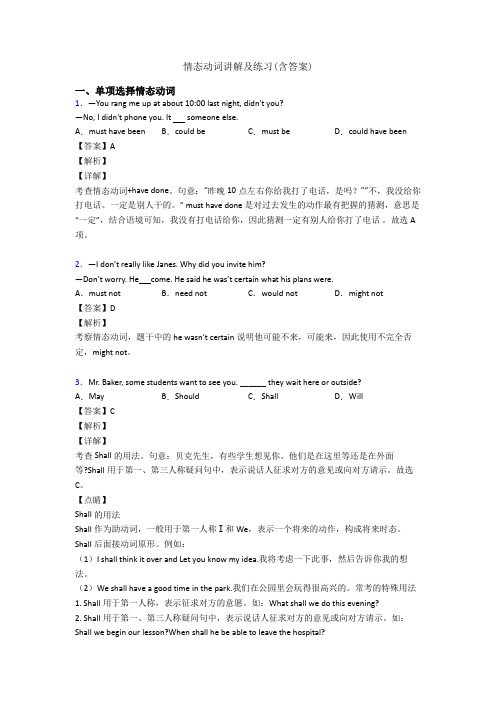
情态动词讲解及练习(含答案)一、单项选择情态动词1.—You rang me up at about 10:00 last night, didn't you?—No, I didn't phone you. It someone else.A.must have been B.could be C.must be D.could have been 【答案】A【解析】【详解】考查情态动词+have done。
句意:“昨晚10点左右你给我打了电话,是吗?”“不,我没给你打电话。
一定是别人干的。
” must have done 是对过去发生的动作最有把握的猜测,意思是“一定”,结合语境可知,我没有打电话给你,因此猜测一定有别人给你打了电话。
故选A 项。
2.—I don’t really like Janes. Why did you invite him?—Don’t worry. He come. He said he was’t certain what his plans were.A.must not B.need not C.would not D.might not【答案】D【解析】考察情态动词,题干中的he wasn’t certain说明他可能不来,可能来,因此使用不完全否定,might not。
3.Mr. Baker, some students want to see you. ______ they wait here or outside?A.May B.Should C.Shall D.Will【答案】C【解析】【详解】考查Shall的用法。
句意:贝克先生,有些学生想见你。
他们是在这里等还是在外面等?Shall用于第一、第三人称疑问句中,表示说话人征求对方的意见或向对方请示。
故选C。
【点睛】Shall的用法Shall作为助动词,一般用于第一人称Ⅰ和We,表示一个将来的动作,构成将来时态。
【英语语法】情态动词can的用法(附练习及答案)
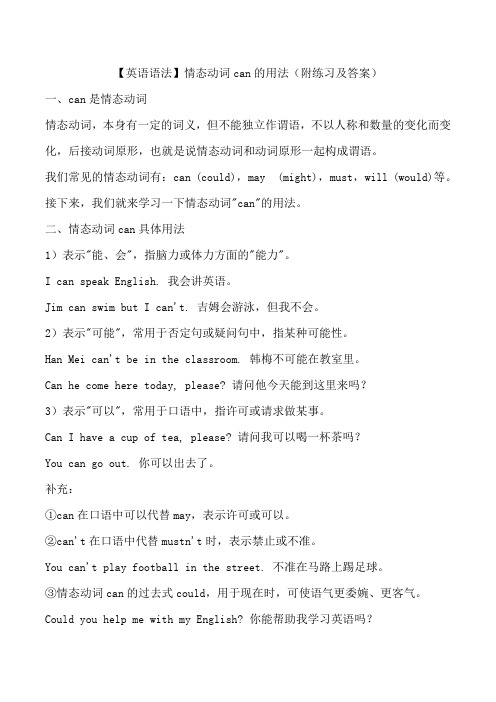
【英语语法】情态动词can的用法(附练习及答案)一、can是情态动词情态动词,本身有一定的词义,但不能独立作谓语,不以人称和数量的变化而变化,后接动词原形,也就是说情态动词和动词原形一起构成谓语。
我们常见的情态动词有:can (could),may (might),must,will (would)等。
接下来,我们就来学习一下情态动词"can"的用法。
二、情态动词can具体用法1)表示"能、会",指脑力或体力方面的"能力"。
I can speak English. 我会讲英语。
Jim can swim but I can't. 吉姆会游泳,但我不会。
2)表示"可能",常用于否定句或疑问句中,指某种可能性。
Han Mei can't be in the classroom. 韩梅不可能在教室里。
Can he come here today, please? 请问他今天能到这里来吗?3)表示"可以",常用于口语中,指许可或请求做某事。
Can I have a cup of tea, please? 请问我可以喝一杯茶吗?You can go out. 你可以出去了。
补充:①can在口语中可以代替may,表示许可或可以。
②can't在口语中代替mustn't时,表示禁止或不准。
You can't play football in the street. 不准在马路上踢足球。
③情态动词can的过去式could,用于现在时,可使语气更委婉、更客气。
Could you help me with my English? 你能帮助我学习英语吗?三、情态动词can的基本句型1)肯定句型为:主语+can+动词原形+其它。
They can play basketball. 他们能打篮球。
初中情态动词的用法猜测及练习(经典)
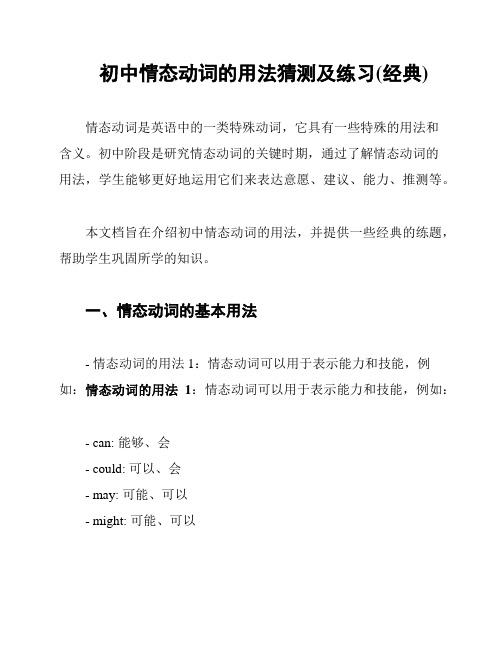
初中情态动词的用法猜测及练习(经典)情态动词是英语中的一类特殊动词,它具有一些特殊的用法和含义。
初中阶段是研究情态动词的关键时期,通过了解情态动词的用法,学生能够更好地运用它们来表达意愿、建议、能力、推测等。
本文档旨在介绍初中情态动词的用法,并提供一些经典的练题,帮助学生巩固所学的知识。
一、情态动词的基本用法- 情态动词的用法1:情态动词可以用于表示能力和技能,例如:情态动词的用法1:情态动词可以用于表示能力和技能,例如:- can: 能够、会- could: 可以、会- may: 可能、可以- might: 可能、可以- 情态动词的用法2:情态动词可以用于表示推测和猜测,例如:情态动词的用法2:情态动词可以用于表示推测和猜测,例如:- must: 必须、一定- should: 应该、应当- ought to: 应该、应当- might: 可能、也许- 情态动词的用法3:情态动词可以用于表示意愿和建议,例如:情态动词的用法3:情态动词可以用于表示意愿和建议,例如:- would: 愿意、将要- should: 应该、应当- ought to: 应该、应当二、练题以下是一些经典的情态动词练题,供学生参考和练:1. 选择合适的情态动词填空:- I __________ go to the party with you, but I have to study for the test tomorrow.- He __________ be a doctor when he grows up.2. 根据语境选择合适的情态动词填空:- A: Can you help me with this math problem?B: Of course! I __________ help you.- A: It's late. We should go home now.B: You're right. We __________ leave.3. 根据句意写出合适的情态动词:- You __________ call your parents and tell them you'll be home late.- I'm not sure, but he __________ be at the library.以上是一些情态动词的用法及练题,学生可以通过不断的练来加深对情态动词的理解和运用。
初一初中英语情态动词完整归纳含答案

初一初中英语情态动词完整归纳含答案一、选择题1.—It’s been a wonderful party. Thank you very much?—- ________________.A.With pleasure B.No , thanks C.It’s OK D.I’m glad you enjoyed it .2.—Anna, can you come to my party tomorrow night?—_________, but I have to stay at home because of the flu.A.I’d love to B.Sounds good C.That’s OK D.Why not 3.—Our family will go to Hangzhou for a holiday this summer.—________.A.Well done B.I am glad to hear thatC.Best wishes to you D.Have fun4.—I plan to find a part-time job in the coming summer holiday.—________ It will be a totally different experience.A.See you later. B.You’d better not.C.I’m sorry to know that.D.That sounds like fun.5.—Oh, no! There isn't any salt left.—____________! I’ll buy some when I go into town.A.Good idea B.Go ahead C.Never mind D.Not at all 6.—I’m afraid I can’t get good grades in the P.E. exam.—________! Train as much as you can.A.Well done B.Keep trying C.Enjoy yourself D.Be careful7.—I thought I’d try to repair the car myself.— __________ ! You know nothing about the car.A.No way B.You can’t be serious C.I couldn’t agree more D.Don’t change a thing8.— I am so sorry to keep you waiting for such a long time.— ________.A.Please shut up B.It’s your mistake C.It doesn’t matter D.Don’t explain it 9.—It's a shame to ask you to lend me more money, but. . .— ______ . You really need money to keep on with your education.A.Don't be silly B.Forget it C.No way D.Don't mention it 10.—Amazingly, I've managed to finish the project by myself.—___________I told you it was easyA.With pleasure. B.Guess what? C.There you are! D.It doesn’t matter 11.--Would you like to go shopping with me on Saturday?-- . I have to help my mother with housework.A.I’m afraid not B.Take your timeC.Enjoy yourself D.That’s all right12.—I’m afraid I can’t find the key to the car.—______. I’ll wait for you. We have enough time.A.Hurry up B.All rightC.It is up to you D.Hold your horses13.—I’m sorry. That wasn’t of much help.— ________. In fact, it was most helpful.A.Thanks anyway B.It doesn’t matter C.Of course not D.Sure it was 14.—I just got a message from Ms. Yang and she said she would come to our meeting this afternoon.— She always has good ideas.A.Why not? B.What a pity! C.Time is up. D.That’ll b e very nice. 15.—I prefer western food. It’s delicious and good for us.—_______ ? But western food is said to be high in sugar and fat.A.Is that right B.How do you know thatC.Do you really think so D.Who told you that16.— What do you think of the movie Mr. Bea ?—____. It’s very funny.A.I can’t stand it .B.I don’t mind it C.I love it. D.I hate it. 17.—Would you like a small or a large bowl of noodles? —_______. I’m very hungry.A.A small bowl B.A large bowl C.Yes, please D.No, thanks 18.—Lucy, can you help me with my history?—________. I am good at it.A.With pleasure B.I’m afraid not C.Sorry, I can’t D.No way 19.—Why not take your son to watch the new film A Little Red Flower?—__________.A.Good idea B.No problem C.Good luck D.No way 20.—I’m sorry I didn’t make it to your birthday party last night.— ________ I know you are busy recently.A.Why not? B.Don’t mention it.C.No way. D.That’s all right. 21.—You seem so happy today, Jack.—________? I won the first prize in the singing competition yesterday.A.So what B.How come C.Guess what D.Why not 22.—Susan, will you please go and empty that drawer?— _________ ?A.What for B.What is it C.How is it D.How come 23.—Jim seems to be in low spirits. ________?—No one liked his plan. All his efforts were useless.A.Guess what B.What about him C.So what D.What happened 24.—________. Where’s the nearest supermarket?—Oh, it’s about 300 meters away, next to a park.A.Thank you B.Excuse me C.Come on D.That’s OK25.–This box is too heavy for me to carry upstairs.–__________A.You may ask for help B.I’ll give you a handC.Please do me a favor D.I’d come to help26.—Many people think women are better at cooking than men.—________. Most top chefs in the world are men.A.I agree B.I can’t agree more C.Not at all D.That’s not the case 27.—All of Mark Twain’s novels are popular.— ________. Especially The Adventures of Tom Sawyer.A.I can’t agree more B.That’s not the case C.That’s not the point D.Don’t mention it 28.—How do you find the documentary DA VID Profile(国宝档案).—________. I can’t think too highly of it.A.It all depends B.It’s really wonderfulC.No one knows for certain D.It is not my cup of tea29.—Would you mind if I open the window?—_______.We need fresh air.A.Not at all B.Yes, of course C.You’d better not D.That’s all right 30.—I find it really unwise to go travelling during May Day holiday.—________! Wherever you go, it’s crowded with cars and people.A.Not exactly B.Forget it C.You said it D.It depends 31.—Only those who have a lot in common can get along well.—________ Opposites sometimes attract.A.I think so. B.I don’t think so.C.I don’t care.D.I hope so. 32.—Only those who have a lot in common can get along well.—________. Opposites sometimes attract.A.I think so B.I don’t think so C.I don’t care D.I hope so 33.—How do you like coffee, Minnie?—It tastes very terrible. ________.A.I have no idea B.I don’t mind it C.I really can’t stand it D.I can’t afford it 34.—Oh, my love, you say you have ordered a dozen cups of bubble tea (奶茶)?—________A.Agree. B.Forget it. C.I really do. D.Are you kidding me? 35.—He is too short to be a successful basketball player.—________ Every dog has its day.A.I think so. B.It’s hard to say.C.That’s right.D.You’d better not. 36.—Hi, everybody! Here is the music.—________. Let’s dance to the music.A.That’s no good B.Here we go C.That’s a shame D.Have a good time 37.—Here’s your change.—________A.My pleasure. B.Thank you. C.With pleasure. D.No problem. 38.—How about putting some pictures into the report?—________ A picture is worth a thousand words.A.I don’t think so.B.Why not?C.Thank you. D.Don’t mention it.39.—Can you tell me how to get to the park?—________—Thank you all the same.A.Show me the map, please.B.Certainly. It’s opposite the mus eum.C.Sorry, I don’t know. I’m a stranger here.D.Sure. Turn right and go along Rock Road.40.—I’ll be away on a business trip. Would you mind looking after my cat?—Not at all. ________.A.It’s my pleasure B.I’d rather not.C.I’d like it.D.With pleasure. 41.—Summer camping gives children the chance to live away from home.—________. It is always good to help children grow up.A.That’s true.B.Come this way. C.Let me have a look. D.I don’t think we agree.42.—I visited the Purple Mountain Observatory by myself last Saturday.—________ Why didn’t you tell me earlier?A.You did? B.I hope not. C.Have a good time. D.I can’t believe it. 43.—Do you think you could finish this project without help?—________. This is not the first time for me.A.Take care B.Don’t worry C.Not exactly D.Hurry up 44.—Our school football team has won the first prize in the match!—________A.Have a good time. B.Nice work. C.Never mind. D.Good luck. 45.—We’ll study in different schools next term. I hope you’ll enjoy your time in the new school!—________A.I’ll take your advice. B.The same to you. C.Congratulations!D.It doesn’t matter.46.— The movie Lost in Russia sends a message about the importance of family.— ________. It reminds me of my parents.A.I hope so B.That’s all right C.You bet D.I don’t think so 47.—Another Friday! Let’s go to see the play tonight.—________ I will book the tickets online.A.My pleasure. B.That’s right.C.Why not? D.Never mind. 48.—Can I look at the menu for a few more minutes before I decide?—Of course. ________, Sir.A.Make yourself at home B.Enjoy yourself C.It doesn’t matterD.Take your time49.—I’m so sorry to keep you waiting for me so long.— ________!A.With pleasure. B.Don’t say so C.I don’t think so D.It doesn’t matter 50.— Mike, are you ready for the coming final exam?— ________. I have prepared it for weeks.A.You bet B.No deal C.Bad luck D.Have fun【参考答案】***试卷处理标记,请不要删除一、选择题1.D【详解】根据情景反应,可知答案为D解析:D【详解】根据情景反应,可知答案为D2.A【详解】句意:——安娜,你能来参加我明晚的聚会吗?——我很想去,但是因为流感我不得不呆在家里。
情态动词讲解canmayshouldmustoughtto区别及用法练习加详解

一、情态动词主要用来表示说话人的看法、态度等1. can (could)1) 表示能力,could主要指过去时间。
例如:① Two eyes can see more than one. 两只眼比一只眼看得清。
② Could the girl read before she went to school? 这女孩上学前能识字吗?因为can不能与其他助动词连用,所以表示将来式时用will be able to例:You will be able to skate after you have practiced it two or three times.注意:Can表示一贯的能力,be able to表示客观能力与通过努力可以达到的能力I can’t swim. But I am sure I will be able to swim through more practicing.The fire spread through the hotel, but everyone was able to get out2) 表示允许。
例如:① Can I have a look at your new pen? 我可以看一看你的新钢笔吗?② He asked whether he could take the book out of the reading—room. 他问他可不可以把书带出阅览室。
3) 表惊异、怀疑、不相信等态度。
主要用于否定句、疑问句或感叹句中。
例如:① Where can (could) they have gone to? 他们会去哪儿了呢?② How can you be so car eless? 你怎么这么粗心?4) 比较委婉客气地提出问题或陈述看法。
例如:① Can (Could) you lend me a hand? 帮我一把好吗?② I’m afraid we couldn’t give you an answer today. 恐怕我们今天不能给你答复。
100例全面解析初中英语情态动词专项练习与答案
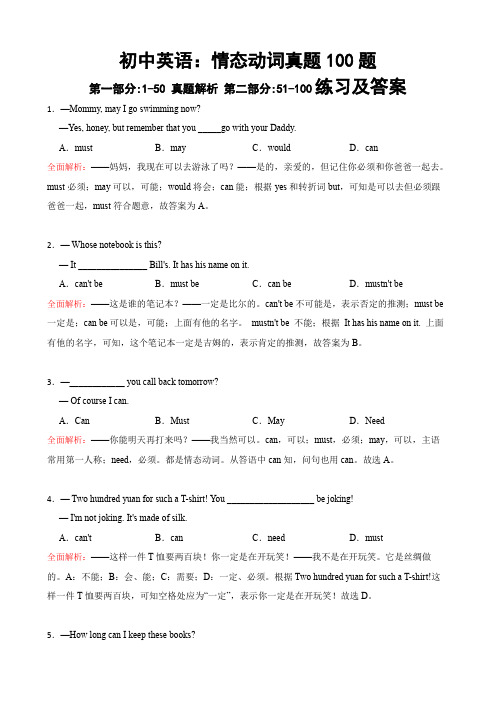
初中英语:情态动词真题100题第一部分:1-50 真题解析第二部分:51-100练习及答案1.—Mommy, may I go swimming now?—Yes, honey, but remember that you _____go with your Daddy.A.must B.may C.would D.can全面解析:——妈妈,我现在可以去游泳了吗?——是的,亲爱的,但记住你必须和你爸爸一起去。
must必须;may可以,可能;would将会;can能;根据yes和转折词but,可知是可以去但必须跟爸爸一起,must符合题意,故答案为A。
2.— Whose notebook is this?— It _______________ Bill's. It has his name on it.A.can't be B.must be C.can be D.mustn't be全面解析:——这是谁的笔记本?——一定是比尔的。
can't be不可能是,表示否定的推测;must be 一定是;can be可以是,可能;上面有他的名字。
mustn't be 不能;根据It has his name on it. 上面有他的名字,可知,这个笔记本一定是吉姆的,表示肯定的推测,故答案为B。
3.—____________ you call back tomorrow?— Of course I can.A.Can B.Must C.May D.Need全面解析:——你能明天再打来吗?——我当然可以。
can,可以;must,必须;may,可以,主语常用第一人称;need,必须。
都是情态动词。
从答语中can知,问句也用can。
故选A。
4.— Two hundred yuan for such a T-shirt! You ___________________ be joking!— I'm not joking. It's made of silk.A.can't B.can C.need D.must全面解析:——这样一件T恤要两百块!你一定是在开玩笑!——我不是在开玩笑。
情态动词专项讲解及练习
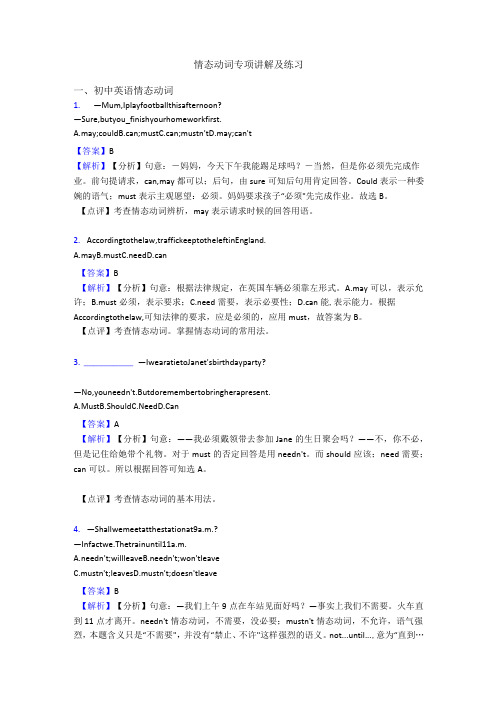
情态动词专项讲解及练习一、初中英语情态动词1.—Mum,Iplayfootballthisafternoon?—Sure,butyou_finishyourhomeworkfirst.A.may;couldB.can;mustC.can;mustn'tD.may;can't【答案】B【解析】【分析】句意:-妈妈,今天下午我能踢足球吗?-当然,但是你必须先完成作业。
前句提请求,can,may都可以;后句,由sure可知后句用肯定回答。
Could表示一种委婉的语气;must表示主观愿望:必须。
妈妈要求孩子“必须"先完成作业。
故选B。
【点评】考查情态动词辨析,may表示请求时候的回答用语。
2.Accordingtothelaw,traffickeeptotheleftinEngland.A.mayB.mustC.needD.can【答案】B【解析】【分析】句意:根据法律规定,在英国车辆必须靠左形式。
A.may可以,表示允许;B.must必须,表示要求;C.need需要,表示必要性;D.can能,表示能力。
根据Accordingtothelaw,可知法律的要求,应是必须的,应用must,故答案为B。
【点评】考查情态动词。
掌握情态动词的常用法。
3.__________ —IwearatietoJanet'sbirthdayparty?—No,youneedn't.Butdoremembertobringherapresent.A.MustB.ShouldC.NeedD.Can【答案】A【解析】【分析】句意:——我必须戴领带去参加Jane的生日聚会吗?——不,你不必,但是记住给她带个礼物。
对于must的否定回答是用needn't。
而should应该;need需要;can可以。
所以根据回答可知选A。
【点评】考查情态动词的基本用法。
4.—Shallwemeetatthestationat9a.m.?—Infactwe.Thetrainuntil11a.m.A.needn't;willleaveB.needn't;won'tleaveC.mustn't;leavesD.mustn't;doesn'tleave【答案】B【解析】【分析】句意:—我们上午9点在车站见面好吗?—事实上我们不需要。
初中英语情态动词详细用法归纳(含练习及答案)
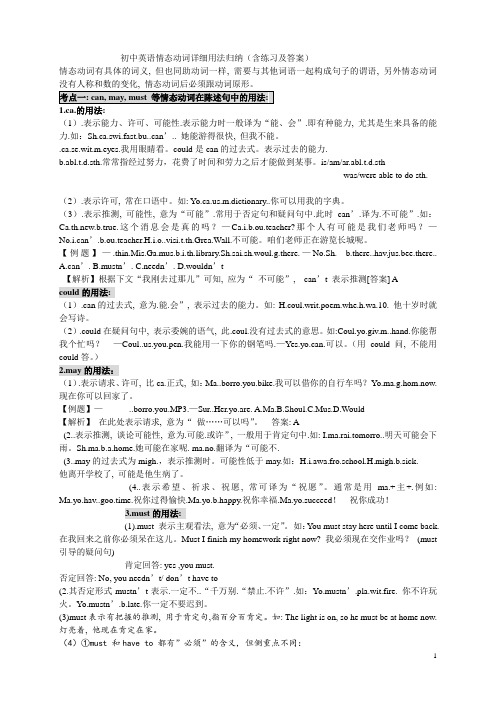
初中英语情态动词详细用法归纳(含练习及答案)情态动词有具体的词义, 但也同助动词一样, 需要与其他词语一起构成句子的谓语, 另外情态动词没有人称和数的变化, 情态动词后必须跟动词原形。
1.ca.的用法:(1).表示能力、许可、可能性.表示能力时一般译为“能、会”.即有种能力, 尤其是生来具备的能力.如:Sh.ca.swi.fast.bu..can’.. 她能游得很快, 但我不能。
.ca.se.wit.m.eyes.我用眼睛看。
could是can的过去式。
表示过去的能力.b.abl.t.d.sth.常常指经过努力,花费了时间和劳力之后才能做到某事。
is/am/ar.abl.t.d.sthwas/were able to do sth.(2).表示许可, 常在口语中。
如: .m.dictionary..你可以用我的字典。
(3).表示推测, 可能性, 意为“可能”.常用于否定句和疑问句中.此时can’.译为.不可能”.如:Ca.th.new.b.true.这个消息会是真的吗?—Ca.i.b.ou.teacher?那个人有可能是我们老师吗?—No.i.can’.b.ou.teacher.H.i.o..visi.t.th.Grea.Wall.不可能。
咱们老师正在游览长城呢。
【例题】—.thin.Mis.Ga.mus.b.i.th.library.Sh.sai.sh.woul.g.there.—No.Sh.__b.there..hav.jus.bee.there..A.can’.B.mustn’.C.needn’.D.wouldn’t【解析】根据下文“我刚去过那儿”可知, 应为“不可能”, can’t 表示推测[答案] Acould的用法:(1).can的过去式, 意为.能.会”, 表示过去的能力。
如: H.coul.writ.poem.whe.h.wa.10. 他十岁时就会写诗。
(2).could在疑问句中, 表示委婉的语气, 此.coul.没有过去式的意思。
情态动词详解(含练习题100道和答案)
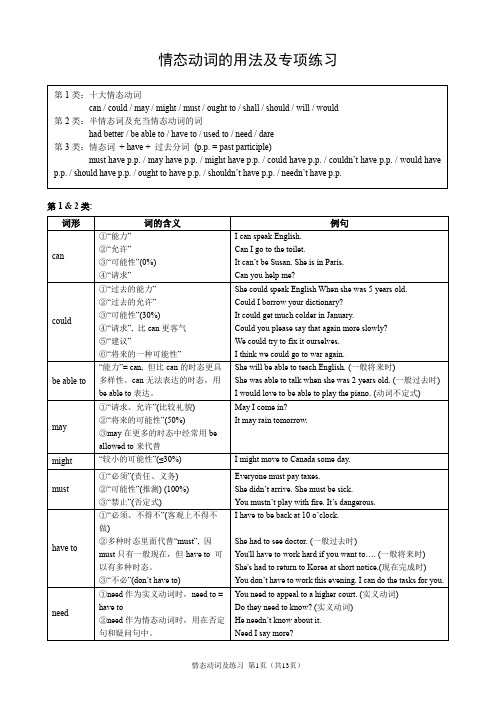
情态动词的用法及专项练习第1 & 2类:第3类:1.could have p.p.①指过去某事有可能发生, 但并未.真的..发生。
They could have won the race, but they didn't try hard enough.He could have studied harder, but he was too lazy and that's why he failed the exam.②指过去有能力做某事, 但并未真的...做过。
I could have stayed up late, but I decided to go to bed early.Julie could have bought the book, but she borrowed it from the library instead.③对过去的发生事情做出一种猜测,但实际上并不知道真假。
仅仅是做一种观点上的表达。
He could have got stuck in traffic.He could have forgotten that we were meeting today.He could have overslept.2. may / might have p.p.(用法与could have p.p.第③点相同)对过去的发生事情做出一种猜测,但实际上并不知道真假。
仅仅是做一种观点上的表达。
He might have got stuck in traffic.He might have forgotten that we were meeting today.He might have overslept.3. couldn't have p.p.渴望、期望做某事, 但由于外部原因不可能做成, 即便是很想做。
是一种虚拟语气。
I couldn't have arrived any earlier. There was a terrible traffic jam (= it was impossible for me to have arrivedany earlier).He couldn't have passed the exam, even if he had studied harder. It's a really, really difficult exam.4. should / ought to have p.p.有一个好主意,该做而没有做。
情态动词讲解及练习

Unit 13 Lesson 4 GrammarA can / could = be able to1 表示水平两种时态can (could),其他时态要用be able to的形式He can speak French.Was/were able to 能够表示成功做成某事的含义* managed to do / succeeded in doing With our help, he was able to build the house.Can I go now? Yes, you can.3 表示推测或可能性,常用于否认句和疑问句Can he be at school?Today is Sunday. He can't be at school.Can’t couldn’t/ Can ? Could? have doneThere is no light in the room. Can she have gone to bed?She can’t have gone to school----- it’s Sunday.Could have done 可用在肯定句中表示过去存有的可能性* may have doneShe could have gone out with some friends yesterday.Could have done 能够表示虚拟语气某事可能发生(并没有发生)It was silly to throw the TV out of the window. It could have hit somebody.批评某人没有完成某事(本能够做某事)You are late again. You could have got up earlier.4 can 表示客观上的可能性*Anybody can make mistakes.B may and might 的用法1 表示请求和允许类似用法can could(更加口语化)May I watch TV now? Yes, you may.2 表示可能性; 猜想might比may更加不确定may/might have done 对过去的揣测*He may be busy these days.May not 可能不;不可能;一定不可3 表示祝愿Wish you success!May you succeed!*C must and have to1 表示必须;一定要能够用have to 代替must 现在;将来的必须而且是主观看法*have to 有多种时态而且强调客观情况I really must stop smoking now.I had to leave early because I wasn’t feeling well.Must I come here?Yes, you must. No, you needn’t. needn’t / don’t have to must not 一定不能做某事mustn’t 2 must 表示推测意思非常肯定“一定是”“一定会”It must be raining outside.Must have done 对过去/完成的推测* must have done, didn’t / hasn’tMust be doing 推测现在正在实行He must have gone over the article, hasn’t he?It must have rained last night, didn’t it?D need and dare 过去时dared情态动词和实意动词的区别A 人称变化B do / to doC 直接否认/ 间接否认can workNeed /dare 肯定句中,实义动词She needs to do it. I dare to do it.使用在否认句,疑问句中,情态动词,实义动词。
初中英语语法:情态动词讲解及练习
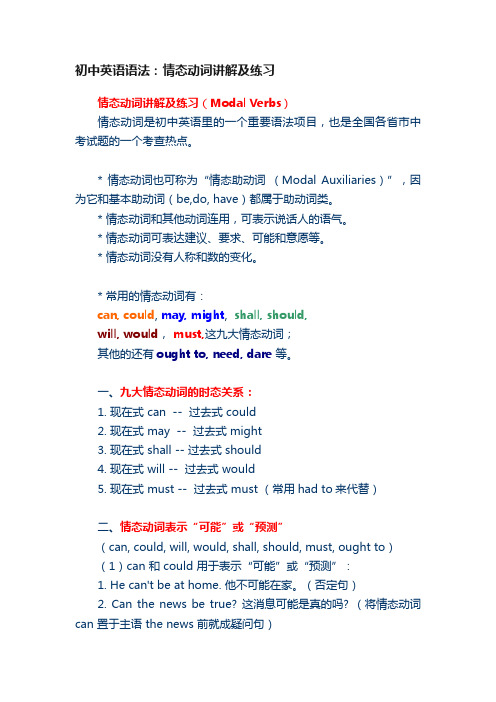
初中英语语法:情态动词讲解及练习情态动词讲解及练习(Modal Verbs)情态动词是初中英语里的一个重要语法项目,也是全国各省市中考试题的一个考查热点。
* 情态动词也可称为“情态助动词(Modal Auxiliaries)”,因为它和基本助动词(be,do, have)都属于助动词类。
* 情态动词和其他动词连用,可表示说话人的语气。
* 情态动词可表达建议、要求、可能和意愿等。
* 情态动词没有人称和数的变化。
* 常用的情态动词有:can, could, may, might, shall, should,will, would,must,这九大情态动词;其他的还有ought to, need, dare等。
一、九大情态动词的时态关系:1. 现在式 can -- 过去式 could2. 现在式 may -- 过去式 might3. 现在式 shall -- 过去式 should4. 现在式 will -- 过去式 would5. 现在式 must -- 过去式 must (常用had to来代替)二、情态动词表示“可能”或“预测”(can, could, will, would, shall, should, must, ought to)(1)can 和 could 用于表示“可能”或“预测”:1. He can't be at home. 他不可能在家。
(否定句)2. Can the news be true? 这消息可能是真的吗? (将情态动词can 置于主语 the news 前就成疑问句)3. Anybody can make mistake. 任何人都可能犯错误。
(只表示理论上的可能性)(2)may 和 might 用于表示“事实上的可能性”或“预测”:1. It may rain tomorrow. (表示可能会发生)明天可能会下雨。
2. It may snow later this afternoon. (表示预测)今天下午可能会下雪。
初中英语情态动词练习题及含答案
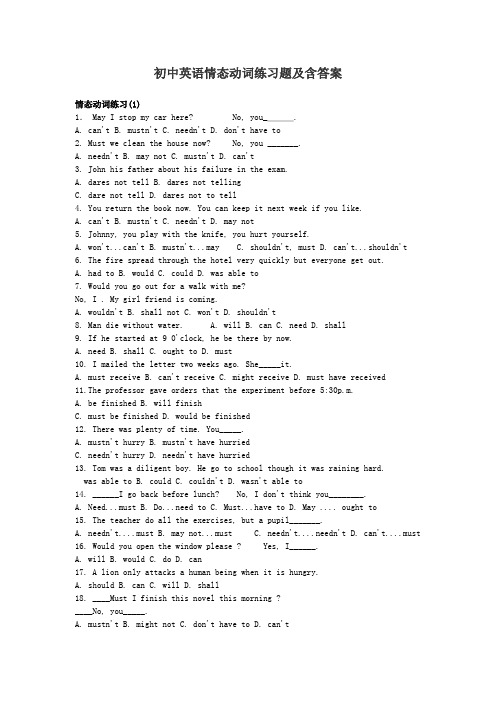
初中英语情态动词练习题及含答案情态动词练习(1)1. May I stop my car here? No, you____.A. can'tB. mustn'tC. needn'tD. don't have to2. Must we clean the house now? No, you _______.A. needn'tB. may notC. mustn'tD. can't3. John his father about his failure in the exam.A. dares not tellB. dares not tellingC. dare not tellD. dares not to tell4. You return the book now. You can keep it next week if you like.A. can'tB. mustn'tC. needn'tD. may not5. Johnny, you play with the knife, you hurt yourself.A. won't...can'tB. mustn't...mayC. shouldn't, mustD. can't...shouldn't6. The fire spread through the hotel very quickly but everyone get out.A. had toB. wouldC. couldD. was able to7. Would you go out for a walk with me?No, I . My girl friend is coming.A. wouldn'tB. shall notC. won'tD. shouldn't8. Man die without water. A. will B. can C. need D. shall9. If he started at 9 0'clock, he be there by now.A. needB. shallC. ought toD. must10. I mailed the letter two weeks ago. She_____it.A. must receiveB. can't receiveC. might receiveD. must have received11.The professor gave orders that the experiment before 5:30p.m.A. be finishedB. will finishC. must be finishedD. would be finished12. There was plenty of time. You_____.A. mustn't hurryB. mustn't have hurriedC. needn't hurryD. needn't have hurried13. Tom was a diligent boy. He go to school though it was raining hard.was able to B. could C. couldn't D. wasn't able to14. ______I go back before lunch? No, I don't think you________.A. Need...mustB. Do...need toC. Must...have toD. May .... ought to15. The teacher do all the exercises, but a pupil_______.A. needn't....mustB. may not...mustC. needn't....needn'tD. can't....must16. Would you open the window please ? Yes, I______.A. willB. wouldC. doD. can17. A lion only attacks a human being when it is hungry.A. shouldB. canC. willD. shall18. ____Must I finish this novel this morning ?____No, you_____.A. mustn'tB. might notC. don't have toD. can't19. The taxi ____ only hold six passengers. It is full. You take the next one.A. may...mayB. can...mayC. may...canD. must...can20. I a little earlier, but I met a friend of mine on the way.A. may comeB. may have comeC. could have comeD. must have come21. I wish to go home now, I?A. mayB. can'tC. mustD. do22. He must have finished his homework, he?A. mustn'tB. didn'tC. needn'tD. hasn't23. This pen looks like mine, yet it isn't. Whose it be?A. mustB. canC. mayD. might24. He didn't do well in the exam. He hard at his lessons.A. must have workedB. ought to have workedC. would have workedD. has worked25. I wonder how he that to the teacher.A. dare to sayB. dare sayingC. not dare sayD. dared say26. Mr Baker, a number of students want to see you. _____ they wait here or outside?A. ShouldB. WillC. ShallD. Are27. You the trees. Look, it is raining now.A. mustn't have wateredB. needn't have wateredC. could have wateredD. might have watered28. I give you an answer tomorrow. I promise!A. mustB. willC. mayD. shall29. As a soldier, you do as the head tells you.A. willB. shallC. mayD. ought30. The streets are all dry. It_____ during the night.A. can't have rainedB. must have rainedC. couldn't rainD. shouldn't have rained31. "When _____ he leave the hospital?" I asked the doctor.A. willB. shallC. canD. may32. They have not finish the work up to now.____Well, they ______A. should haveB. shouldC. ought toD. ought have33. Since it is already midnight, we______.A. had better leavingB. ought to have leaveC. should take our leaveD. might as well leave34. you be happy!A. MayB. CanC. MustD. Would35. Must we come tomorrow?A. No, you can'tB. No, you needn'tC. No, you mustn'tD. No, you may not36. You miss the lesson, though we have it on Thursday.A. mustn't...needn'tB. needn't....mustn'tC. mustn't...mustn'tD. needn't...needn't37. To succeed in a difficult task,_____.A. one needs to work hardB. to work hard is neededC. you need be a hard working personD. to work hard is what one needs38. In case I______, I would try again.A. will failB. would missC. should failD. shall miss39. Some people feel that handguns______.A. should controlB. should be controlledC. must be controllingD. can be control40. ______ open the door for you ?A. Would you like that IB. Do you want that IC. Will ID. Shall I41. My son ____ the examination, but he wasn't careful enough.A. might be able to passB. must have passedC. could have passedD. were able to pass42. Isn't it strange that the lazy boy pass the exam?A. shouldB. hasC. mightD. would43. We the work so early without your help.A. couldn't finishB. can't finishC. couldn't have finishedD. can't have finished44. We the manager, but no one _____ his telephone number.A. could have called, knewB. could have called, had knownC. could call, had knownD. could call, knew45. "Would you come and join them?""I wish I . But I am busy at this moment.A. can'tB. couldn'tC. couldD. can46. If Alice this afternoon, the meeting should be put off.A. would not comeB. might not comeC. should not comeD. could not come47. I didn't see her in the meeting room this morning. She at the meeting.A. mustn't have spokenB. shouldn't have spokenC. needn't have spokenD. couldn't have spoken48. With so much work on hand, you to see the game last night.A. mustn't goB. shouldn't goC. couldn't have goneD. shouldn't have gone49. I thought you like something to read, so I have brought you some books.A. mayB. mightC. couldD. must50. There was plenty of time. She______.A. mustn't have hurriedB. couldn't have hurriedC. must not hurryD. needn't have hurried51. It's still early, you______.A. mustn't hurryB. wouldn't hurryC. may not hurryD. don't have to hurry52. Please open the window,________?A. can't youB. aren't youC. do youD. will you53. We for her because she never came.A. mustn't have waitedB. shouldn't have waitedC. mustn't waitD. needn't wait54. May I stop here?No, you ____.A. mustn'tB. might notC. needn'tD. won't55. He _____ you more help, even though he was very busy.A. might have givenB. might giveC. may have givenD. may give56. I didn't see her in the meeting room this morning. She at the meeting.A. mustn't have spokenB. shouldn't have spokenC: needn't have spoken D. couldn't have spoken57. Could I borrow your dictionary? Yes, of course you______.A. mightB. willC. canD. should58. Please don't make a noise. --I'll be as quiet as a mouse.A. Yes, I won'tB. No, I won'tC. No, I willD. Yes, I will59. The young man has made so much noise that he not have been allowed to attend theconcert.A. couldB. mustC. wouldD. should60. One ought for what one has done.A. not to be punishedB. to not be punishedC. to not punishedD. not be punished61. If you really want yourself to be in good health, you must always so much..A. not, be smokingB. not, have smokedC. not, to smokeD. be not, smoking62. Where is Mary?She isn't here. I think she_____.A. may have gone homeB. must have gone homeC. might have gone homeD. All the above63. I think Helen is at home.No, she be at home, for she phoned me from the airport just five minutes ago.A. mustn'tB. needn'tC. can'tD. dared not64. She is already two hours late. What to her?A. can have happenedB. may have happenedC. should have happenedD. must happen65. “ he be watching TV now?”"Yes, he be watching TV now?""No, he be watching TV now."A. Must, can, mustn'tB. Can ,must, can'tC. Can, can, mustn'tD. May, must, needn't66. You must be a writer, ______?A. mustn't youB. are youC. must youD. aren't you67. You must have seen him last night, ?A. haven't youB. didn't youC. don't youD. must you68. I got up early this morning, but I _______so because I had no work to do.A. mustn't have doneB. didn't need to doC. needn't have doneD. can't have done69. Let's say that you could go there again, how feel?A. will youB. should youC. would youD. do you70. I daren't tell you what he did for fear that he angry with.A. will beB. isC. wasD. should be71. Without the leadership of the Party, there no New China.A. would beB. has beenC. wasD. should be72. It is necessary that we a foreign language.A. must masterB. ought to masterC. masterD. should master73. Most of the students felt rather disappointed at the English party. They say that it _______ better organized.A. had beenB. had to beC. must have beenD. could have been74. I am surprised that he to help me when I needed it most.A. should refuseB. would have refusedC. should have refused toD. may have refused75. Look! Tom is too sleepy to work .He __ up watching TV.A. mustn't have stayedB. shouldn't have stayedC. mustn't stayD. ought not to say. 练习题答案1-10 BACCB DCADD 11-20 ADACA ACCBC 21-30 ADBBDCBBBA 31-40 BADAB AACBD 41-50 CACAC CDDBD 51-60 DDBAA DCBDA61-70 ADCAB DBCCB 71-75 ADDCB。
(完整word版)初一情态动词讲解及练习附答案
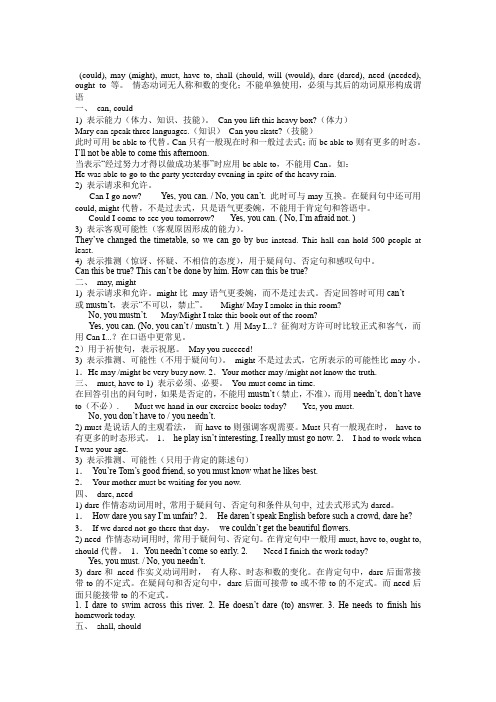
(could), may (might), must, have to, shall (should, will (would), dare (dared), need (needed), ought to等。
情态动词无人称和数的变化;不能单独使用,必须与其后的动词原形构成谓语一、can, could1) 表示能力(体力、知识、技能)。
Can you lift this heavy box?(体力)Mary can speak three languages.(知识)Can you skate?(技能)此时可用be able to代替。
Can只有一般现在时和一般过去式;而be able to则有更多的时态。
I’ll not be able to come this afternoon.当表示“经过努力才得以做成功某事”时应用be able to,不能用Can。
如:He was able to go to the party yesterday evening in spite of the heavy rain.2) 表示请求和允许。
-----Can I go now? ----- Yes, you can. / No, you can’t. 此时可与may互换。
在疑问句中还可用could, might代替,不是过去式,只是语气更委婉,不能用于肯定句和答语中。
---- Could I come to see you tomorrow? ---- Yes, you can. ( No, I’m afraid not. )3) 表示客观可能性(客观原因形成的能力)。
They’ve changed the timetable, so we can go by bus instead. This hall can hold 500 people at least.4) 表示推测(惊讶、怀疑、不相信的态度),用于疑问句、否定句和感叹句中。
七年级英语:情态动词专项练习带答案解析
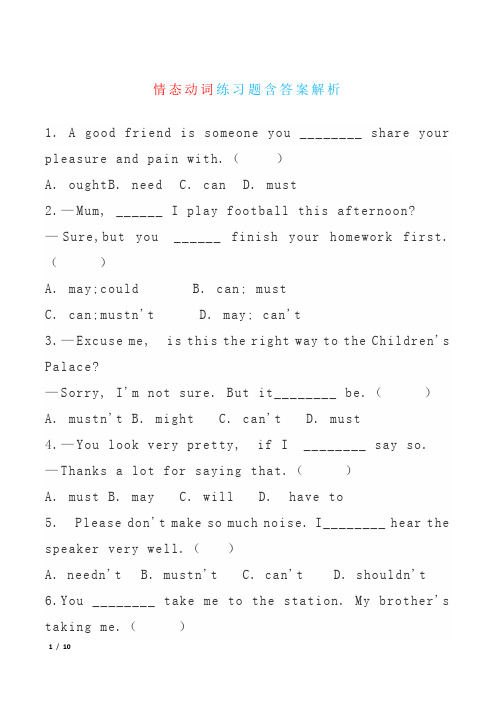
情态动词练习题含答案解析1. A good friend is someone you ________ share your pleasure and pain with.()A. oughtB. needC. canD. must2.—Mum, ______ I play football this afternoon?—Sure,but you ______ finish your homework first.()A. may;couldB. can; mustC. can;mustn'tD. may; can't3.—Excuse me, is this the right way to the Children's Palace?—Sorry, I'm not sure. But it________ be.()A. mustn'tB. mightC. can'tD. must4.—You look very pretty,if I ________ say so. —Thanks a lot for saying that.()A. mustB. mayC. willD. have to5. Please don't make so much noise. I________ hear the speaker very well.()A. needn'tB. mustn'tC. can'tD. shouldn't6.You ________ take me to the station. My brother's taking me.()A. can'tB. mustn'tC. shouldn'tD. don't have to7.—Mum, ________ I visit the Modern ArtMuseum next Monday?—I'm afraid you can't. All the museums in thiscity are closed on Monday.()A. wouldB. needC. shouldD. may8.We need clean air and water,so we ________ protect the environment.()A. canB. mayC. mustD. might9. —What should we do to protect the fish in the river?—We________ throw rubbish into the river.()A. needB. needn'tC. mustD. mustn't10.—What's wrong with Judy? She has been absent for two days.—Oh, she_____ be ill. Let's go to ask Mr. Green.()A. mayB. needC. would11.—We've got everything ready for the picnic.—Do you mean I______ bring anything with me?()A. can't B. mustn't C. couldn't D. needn't12.—Excuse me, ________ I take the magazine out of the reading room?—Sorry, you can't. Just here, please.()A. mustB. wouldC. mayD. need13.Rock music ___ sound popular with the young,but it's not the favor of the aged people.()A. mustB. needC. shouldD. may14.—Must I wait here all morning? I have a lot of work to do.—No, you____. You may be back in the afternoon.()A. mustn'tB. can'tC. don't have to15.The passengers ______ show their ID cards before getting on the plane.()A. mightB. mustC. could16. —Finally, they came back.—They_____ be hungry after such a long walk.()A. can'tB. mustC. needn't17. —I still haven't found my pet dog.—I'm sorry to hear that. You_____ be very sad.()A. canB. shouldC. mustD. will18. —Look at the young lady in red. Is it Mrs.Li?—No. It________ be her. She is wearing a white dress today.()A. mustn'tB. needn'tC. can't19. —Is that man Mr.Zhang?—It________ be him. He went to Beijing for a meeting yesterday.()A. can'tB. mustn'tC. needn't20. The girl in the classroom ________ be Sarah. She has gone to the library.()A. mayB. mustC. can'tD. needn't21. —Whose bike is this?—I am not sure. It ________ be Mary's.()A. shallB. mustC. might22. —Where are you going this month?—We________ go to Xiamen,but we're not sure.()A. needn'tB. mightC. mustD. mustn't23. —Is Tom coming by train?—He________ drive his car,I'm not sure.()A.can't B. may C. Must解析答案句意:一个好朋友就是和你一起分享你的快乐和悲伤的人。
初中英语情态动词讲解-练习及答案
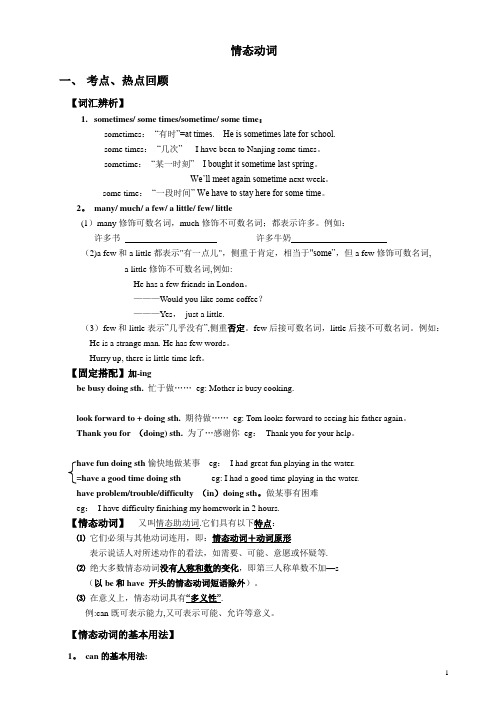
情态动词一、考点、热点回顾【词汇辨析】1.sometimes/ some times/sometime/ some time:sometimes:“有时”=at times. He is sometimes late for school.some times:“几次” I have been to Nanjing some times。
sometime:“某一时刻” I bought it sometime last spring。
We’ll meet again sometime next week。
some time:“一段时间” We have to stay here for some time。
2。
many/ much/ a few/ a little/ few/ little(1)many修饰可数名词,much修饰不可数名词;都表示许多。
例如:许多书许多牛奶(2)a few和a little都表示"有一点儿",侧重于肯定,相当于"some”,但a few修饰可数名词,a little修饰不可数名词,例如:He has a few friends in London。
———Would you like some coffee?———Yes,just a little.(3)few和little表示”几乎没有”,侧重否定。
few后接可数名词,little后接不可数名词。
例如:He is a strange man. He has few words。
Hurry up, there is little time left。
【固定搭配】加-ingbe busy doing sth.忙于做……eg: Mother is busy cooking.look forward to + doing sth. 期待做……eg: Tom looks forward to seeing his father again。
- 1、下载文档前请自行甄别文档内容的完整性,平台不提供额外的编辑、内容补充、找答案等附加服务。
- 2、"仅部分预览"的文档,不可在线预览部分如存在完整性等问题,可反馈申请退款(可完整预览的文档不适用该条件!)。
- 3、如文档侵犯您的权益,请联系客服反馈,我们会尽快为您处理(人工客服工作时间:9:00-18:30)。
七年级下册(1)情态动词常见的情态动词:can, could, may, might, must, should, need, had better have to等含义:表示说话人对所述动作的看法,如需要、可能、意愿或怀疑等。
1.用法特点:⑴它们必须与其他动词连用,即:肯定:情态动词+动词原形:He can swim.否定:情态动词+not+动词原形:He can not(can’t)swim.一般疑问句:把情态动词提前:Can he swim?Yes,he can./No,he can’t.表示说话人对所述动作的看法,如需要、可能、意愿或怀疑等。
⑵情态动词没有人称和数的变化,即第三人称单数不加-s,有些情态动词有时态的变化⑶在意义上,情态动词具有“多义性”。
例:can既可表示能力,又可表示可能、允许等意义。
2.各情态动词的用法(1)can:表能力,“能,会”;表可能,猜测,通常用于否定句和疑问句中,This boat can’t be hers, hers is black.(2)could:表can的过去式;表请求允许,比can更委婉地提出请求。
(3)May: 表猜测,“可能”(只能用于肯定句,否定句用can’t)表征求同意,May I come in?(4)Might: may的过去式;might比may更加委婉。
(5)Must: 表义务的“必须”表事情的必要性和重要性。
You must take care of your parents. 表推测的“一定,准是”(只有肯定猜测,否定猜测用can’t)The lady must be a doctor.(6)Should: 表义务或责任“应该”。
(7)Need: 表必要性。
(8)Would: will的过去式;表示意愿或用于第二人称的疑问句中,表礼貌委婉的请求,比can更委婉。
(9)Had better: 最好,(had better not)3.易混的情态动词(1)Can/ could 与be able to: 表“能力”时can只有现在和过去时两种时态,其余时态用be able to,can指与生俱来的能力,be able to后天形成的能力。
(2)含有情态动词的疑问句的回答:1).对may引出的问句,可以有下列回答方式:Yes,you may. Yes, of course.Yes, certainly.Sure .No, you can’t.2).对must引出的疑问句,回答方式为:Yes, …must.No,…don’t(doesn’t) have to./needn’t3).could在疑问句中,表示委婉的语气,此时could没有过去式的意思。
如:Could you help me?你能帮我个忙吗?—Could I use your pen?我能用一下你的钢笔吗?—Yes, you can.可以。
(注意回答)4).would you…的回答方式有以下几种:Yes, I will. (No, I won’t.)Sure . (I’m sorry , I can’t.)All right/ OK/ With pleasure.Certainly. (No, thank you .)Yes, please.(3)Must 的否定形式:mustn’t “不许,禁止”(must表推测时无否定形式,否定猜测用can’t)(4)Need:作实义动词时,后接名词、动名词、动词不定式She doesn’t need to take any medicine.作情态动词时后接动词原形。
She need take some medicine.一、用can, may, must, need, have to, had better的适当形式填空:1. You ________________ return the library book on time.2. I ______________ (not) find the way to the hospital. _______________ youshow me the way?3. —________________ I finish the work right now?— No, you ________________ (not). You ____________ do it later.4. He said he ________________ (not) come tonight.5. Her mother was ill. She ________________ stay at home and look after her.6. It’s time for class. You ________________ stop playing football or you__________be late for class.7. We ________________ start right now, or they would get there first.8. The cloud is lifting, so it ________________ (not) be a rainy day tomorrow.二、选择填空()1.—Do we have to finish our homework this afternoon?—Yes, you ________.A. mustB. canC. mayD. need()2. —Must I be in hospital for a week,Doctor?—No,you . You can go back home tomorrow.A.mustn’tB. needn’tC. must()3. The desk is not dirty. You _______clean it.A. mustn’tB. shouldn’tC. needn’t C. can’t()4. —May I watch TV for a while?—No, you _______. You have to finish your homework first.A. shouldn’tB. needn’tC. mustn’tD. won’t()5.—Is Jessica giving us a speech this evening?—No, it ________be her. She________ to Japan.A. mustn’t; has goneB. mustn’t ;has beenC. can’t ;has goneD.can’t ;has been()6. I t’s the library! So you________ know shouting is not allowed here.A. canB. mustC. needD. may()7. Boys and girls, don’t forget your report . It ______ today.A. can’t finishB. can’t be finishedC. should finishD. should befinished()8.—Mr Smith must have been to your home this morning.—No, he ______ ,because he didn’t know my address.A. couldn’tB. can’tC. mustn’tD. may not()9. —Must I mop up the window now?—No, you________.A.needn’tB. can’tC. shouldn’tD. mustn’t()10. —Is Lucy knocking at the door?—No. It ________ be Lucy. She is in Japan now.A. needn’tB. mustC. can’t()11. —Another cup of coffee?—No, thanks. I _____ be off. Mary is waiting for me.A. canB. mayC. mustD. might()12. —I’m a little tired. Let’s go to the zoo by taxi.—We take a taxi. It’s not far from here.A. can’tB. mustn’tC. couldn’tD. needn’t()13. If the traffic light is red, you ________ cross t he road. It’s very dangerous.A. don’tB. mustn’tC. needn’tD. wouldn’t()14. —Must I finish watering the flowers now?—No, you________.A. mustB. won’tC. needn’tD. can’t()15. —I can’t give up sm oking, doctor.—For your health, I’m afraid you ________.A. mayB. canC. have toD. must()16. It is usually warm in my hometown in March, but it _______ be rather cold sometimes.A. mustB. canC. shouldD. would()17. —Our class won the English speaking contest.—Congratulations! You _______ be very proud of it.A. canB. needC. wouldD. must()18. —Excuse me, where are we going to have our class meeting?—I’m not sure. Ask our monitor, please. He know.A. canB. mayC. needD. shall()19. —____________I borrow these magazines?—Sorry, only the magazines over there can be borrowed.A. MustB. WouldC. MayD. Need()20. If the traffic light is red, you ________ cross the road. It’s dangerous.A. don’tB. needn’tC. mustn’tD. wouldn’t 【中考链接】()1.—Who is the man over there? Is it Mr. Li?— No, it ______ be him. Mr. Li is much taller.A. mustn’tB. may noC. can’tD. needn’t()2.—Must I go with them tomorrow?— No,you ______.A. mustn'tB. shouldn'tC. needn'tD. can't()3.—______ I take some photos in the hall?— No, you ______.A. Can, needn’tB. Must, mustn’tC. Could, won’tD. May, mustn’t ()4.—Dad, must I finish my homework today?—No, you ________. You may do it tomorrow.A. needn’tB. mustn’tC. don’tD. won’t ()5.—The lake is said to be dry. Is that true?—It _______.Look, some kids are swimming in it.A. must be trueB. can’t be trueC. may not be true()6.—What is your mother going to do this Saturday?—I’m not sure. She _____ go to see my grandmother.A. canB. mustC. may()7.—Susan has bought a large house with a swimming pool.—It ______ be very expensive. I never even dream about it.A. mustB. mightC. can’tD. shouldn’t ()8.—Listen! Is Professor Johnson giving a report in the hall?—No, it be him. He has gone to Japan.A. needn’tB. may notC. mustn’tD. can’t()9.—Let’s go to the West Hill Park by taxi.—Oh, it is not far away from here. We _______take a taxi.A. couldn’tB. mustn’tC. needn’tD. can’t()10.—Can you play the piano?—Yes, I _______. I often practice it on weekends.A. needn’tB. needC. can’tD. can。
